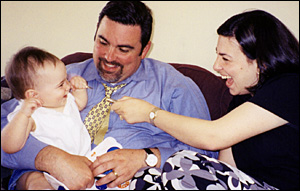|
It's only been in the past decade that doctors identified and began studying depression during pregnancy.
 | Perinatal psychiatrist Lee Cohen runs one of the leading centers in the country specializing in mood disorders during pregnancy. Photo by Sasha Aslanian |
"When I trained," says Dr. Lee Cohen, a perinatal psychiatrist at Massachusetts General Hospital in Boston, "Clinical lore went along the lines that women did fine during pregnancy, that they were protected because of the reproductive hormones."
Nearly twenty years later, Cohen runs one of the leading centers in the country specializing in mood disorders during pregnancy. He says women in this situation haven't always found good information.
Five years ago, when she was considering becoming pregnant and wondering what to do about her medication, Lisa
Kirshenbaum of Cranston, Rhode Island, a suburb of Providence, says her psychiatrist told her to stop taking the drugs for the sake of the baby, and not to worry.
"He said most women, when they're pregnant, don't suffer from depression. Most women have this sort of natural high when they're pregnant."
That worked for her first pregnancy, but for the second, going off her antidepressant during pregnancy brought on a swift and debilitating relapse. She and her husband Evan struggled to find help.
"They were pushing for us non-medication alternatives," explains Evan
Kirshenbaum, "like exercise, yoga, meditation tapes."
 | The
Kirshenbaums struggled with how to treat Lisa's severe depression during her second pregnancy. They are pictured here with daughter Lucy, born after Lisa resumed her medication. Photo by Sasha Aslanian |
Lisa
Kirshenbaum adds, "I had needles put in my toes and I'm laying there thinking - I felt like I was dying. Someone had to help me. I remember saying to him, 'Please help me, please help me, please help me.' I was just so desperate."
The couple turned to Lisa's obstetrician, and other psychiatrists, but they say no one was equipped to deal with their problem.
"At one particular doctor's appointment," says Evan Kirshenbaum, "he handed us a medical journal article. I'm not a doctor. It was just kind of dumped in our lap."
"Basically," says Lisa Kirshenbaum, "'these are the risks you're going to face. I'm very hesitant to prescribe but if you insist these are the risks and they're pretty high.' I mean we were - we were really scared."
The Kirshenbaums were warned about the risk of organ malformation during the early weeks of pregnancy, something that Lee Cohen, the perinatal psychiatrist, says has not been borne out by almost two decades worth of international surveillance by the drug makers and independent registries. With her third pregnancy, Lisa
Kirshenbaum came to Dr. Cohen for help. He switched her to an antidepressant he considered safer and she had a healthy baby.
Prozac is the oldest SSRI or Selective Seratonin Reuptake Inhibitor. It went on the market in the United States in 1987. Although the FDA has never approved any SSRIs for use during pregnancy, they are so widely prescribed in the general population that Cohen says there's a lot of data about them - even during pregnancy.
"We know much more about the SSRIs in terms of their reproductive safety than most of the medications women take during pregnancy."
And so far, Cohen says, the news is pretty good.
"There are essentially no reports that suggest using SSRIs during the first trimester of pregnancy increases the risk of organ malformations. That's a very reassuring message." (update)
Cohen says while the information about SSRIs isn't perfect, it's his sense that if there were some serious negative outcome, it would have surfaced by now.
Continue to part 2
| 
